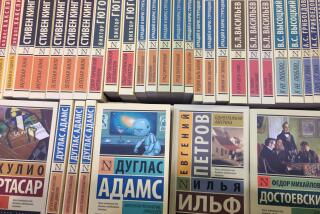Looking Beyond the Emphasis on Western Civilization
- Share via
Once again you have printed an article on the need to understand, teach, and analyze non-Western cultures. The opinions expressed by Freedman are quite correct; understanding other societies is essential to our survival as a nation. The downside is that all this has been said again and again, and the situation is not improving--our young people still do not study foreign languages or cultures. Appealing to teen-agers to study Russian, Japanese, or Chinese for the sake of their nation’s future is not a productive approach.
There is, however, another way. We must utilize an invaluable resource that is unique to the United States--the brainpower of those who speak the foreign language fluently, who have been trained in the ways of another culture for most of their lives, who have first-hand knowledge and understanding--the immigrants!
The approximately 150,000 former Soviet citizens who came to the U.S. during the last 10 years are a national treasure that is not being used nearly enough. The relatively few who found a niche in the academe or a think-tank are a drop in the bucket. News and analysis of the Soviet Union is supplied by foreign correspondents who by and large are unable to speak or read Russian with ease, domestic journalists who are far too easily misled, and by the few legitimate Sovietologists who are seldom available to the public.
The Media Analysis Foundation is a recently founded, nonprofit, publicly supported organization which will attempt to remedy this disgraceful situation. Our first task is the launching this spring of a magazine that will publish, in English, translations of articles from the Soviet press, emigre sources, analyses and commentary by genuine former Soviet experts, underground humor, and even the gossip and rumors from the USSR.
M.A.F.’s utilization of the expertise of former Soviet citizens will provide the average American with the opportunity to judge, intelligently, the nature of Soviet society, conditions of Soviet life, and form opinions on what policy may or may not be appropriate.
SI FRUMKIN
Studio City
More to Read
Sign up for Essential California
The most important California stories and recommendations in your inbox every morning.
You may occasionally receive promotional content from the Los Angeles Times.










